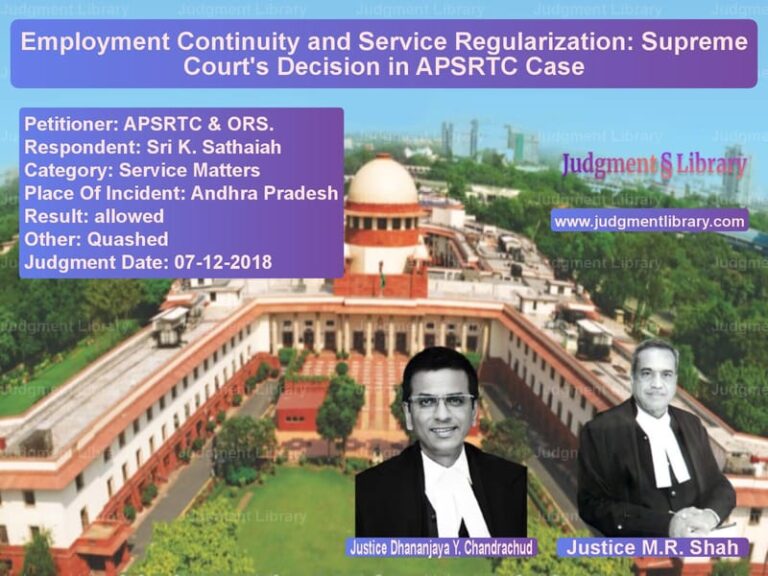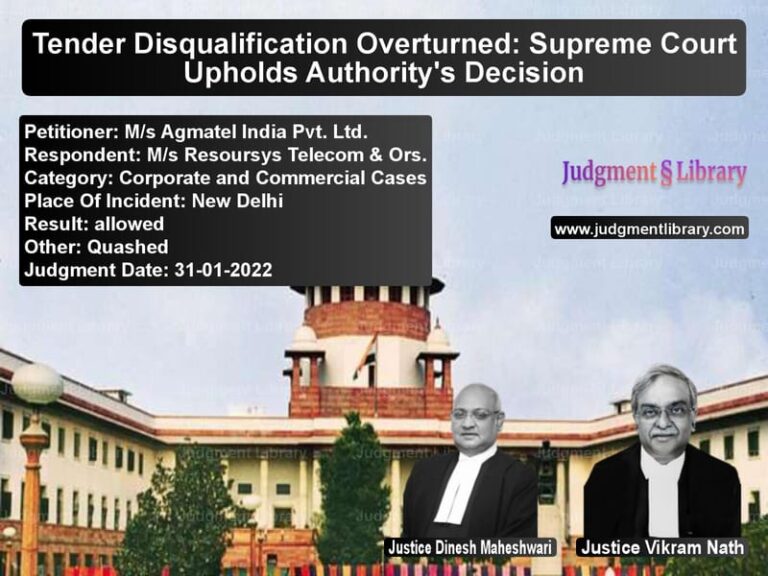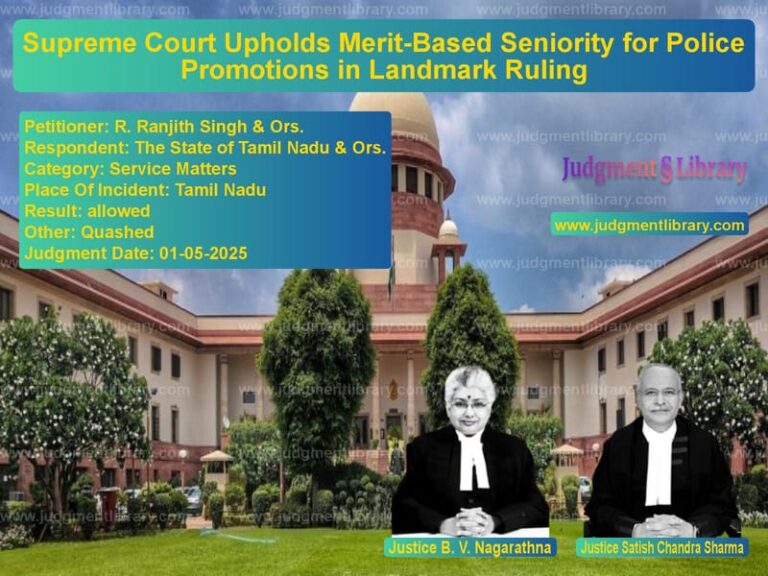Supreme Court Declines to Direct Parliament on Custodial Torture Law
The Supreme Court of India, in the case of Dr. Ashwani Kumar vs. Union of India & Another, addressed a significant constitutional question regarding judicial intervention in legislative processes. The case revolved around whether the Supreme Court could direct the Parliament to enact a standalone comprehensive law against custodial torture in line with the United Nations Convention Against Torture (UN Convention), which India has signed but not ratified.
Background of the Case
The petitioner, Dr. Ashwani Kumar, a senior advocate and former law minister, had filed a writ petition under Article 32 of the Constitution seeking a legislative framework to prevent custodial torture. The petition was based on India’s obligation under the UN Convention, which was signed in 1997 but not ratified. The Supreme Court had previously disposed of the petition in 2017, acknowledging the government’s commitment to consider the recommendations of the Law Commission of India on the subject.
In 2018, the petitioner filed a miscellaneous application requesting the Court to issue directions to the central government to enact a law against custodial torture, arguing that it was a fundamental issue of human dignity and protection under Article 21 of the Constitution.
Key Legal Issues Considered
- Whether the Supreme Court could direct Parliament to enact a specific law on custodial torture.
- Whether India’s failure to enact a law on custodial torture violated fundamental rights under Article 21.
- Whether existing laws were sufficient to address custodial torture and whether international treaty obligations required legislative action.
Arguments by the Petitioner (Dr. Ashwani Kumar)
The petitioner contended:
- Custodial torture is a violation of human dignity and fundamental rights under Article 21.
- The Supreme Court, in previous cases, had issued guidelines where legislative action was absent, such as in Vishaka v. State of Rajasthan (on sexual harassment at the workplace).
- The National Human Rights Commission and the Law Commission had already recommended a law against custodial torture.
- The failure to enact such a law despite signing the UN Convention reflected negligence on the part of the government.
Arguments by the Respondent (Union of India)
The central government argued:
- The draft law on custodial torture was under active consideration and had been referred to state governments and Union Territories for their inputs.
- The legislature has exclusive authority to enact laws, and any direction by the judiciary would violate the doctrine of separation of powers.
- Existing laws under the Indian Penal Code, Code of Criminal Procedure, and Supreme Court guidelines in D.K. Basu v. State of West Bengal already provided safeguards against custodial torture.
- Any decision to ratify the UN Convention was a political decision requiring consultation with stakeholders.
Supreme Court’s Observations
The Supreme Court examined the constitutional principle of separation of powers and judicial review. The Court made the following key observations:
- The judiciary does not have the authority to direct Parliament to enact specific legislation.
- The doctrine of separation of powers prevents the judiciary from encroaching on legislative functions.
- While courts have issued guidelines in the absence of laws, such interventions were meant to fill temporary legal voids and not to mandate legislative action.
- India’s failure to ratify the UN Convention does not automatically create a legal obligation to enact a new law, as international treaties require legislative approval before implementation.
- The matter was already under active consideration by the government, and judicial interference at this stage would be inappropriate.
Final Judgment
The Supreme Court dismissed the application, ruling:
“The power to enact laws rests with the legislature, and the Court cannot issue directions to Parliament to legislate on a particular subject. The issue of custodial torture is a matter of serious concern, but it is for the government to frame and pass laws.”
The Court reaffirmed that judicial review does not extend to directing the legislature to act in a specific manner but is limited to reviewing the validity of existing laws.
Implications of the Judgment
- For Legislative Processes: The judgment reinforces the principle that courts cannot direct legislatures to enact specific laws.
- For Human Rights Advocacy: The decision emphasizes the need for continued advocacy for a standalone law against custodial torture.
- For International Commitments: India’s failure to ratify the UN Convention remains a policy decision, not a judicially enforceable obligation.
- For Judicial Precedents: The ruling aligns with past decisions where courts have refrained from directing legislatures to enact laws, such as in Common Cause v. Union of India.
Conclusion
The Supreme Court’s ruling underscores the importance of adhering to constitutional principles, particularly the separation of powers. While the Court acknowledged the severity of custodial torture and the need for legislative action, it maintained that such action must originate from Parliament and not judicial directives. The decision sets a precedent for judicial restraint in matters involving legislative policy and law-making.
Petitioner Name: Dr. Ashwani Kumar.Respondent Name: Union of India & Another.Judgment By: Justice Ranjan Gogoi, Justice Dinesh Maheshwari, Justice Sanjiv Khanna.Place Of Incident: India.Judgment Date: 05-09-2019.
Don’t miss out on the full details! Download the complete judgment in PDF format below and gain valuable insights instantly!
Download Judgment: Dr. Ashwani Kumar vs Union of India & Ano Supreme Court of India Judgment Dated 05-09-2019.pdf
Direct Downlaod Judgment: Direct downlaod this Judgment
See all petitions in Fundamental Rights
See all petitions in Public Interest Litigation
See all petitions in Constitution Interpretation
See all petitions in Judgment by Ranjan Gogoi
See all petitions in Judgment by Dinesh Maheshwari
See all petitions in Judgment by Sanjiv Khanna
See all petitions in dismissed
See all petitions in supreme court of India judgments September 2019
See all petitions in 2019 judgments
See all posts in Constitutional Cases Category
See all allowed petitions in Constitutional Cases Category
See all Dismissed petitions in Constitutional Cases Category
See all partially allowed petitions in Constitutional Cases Category







